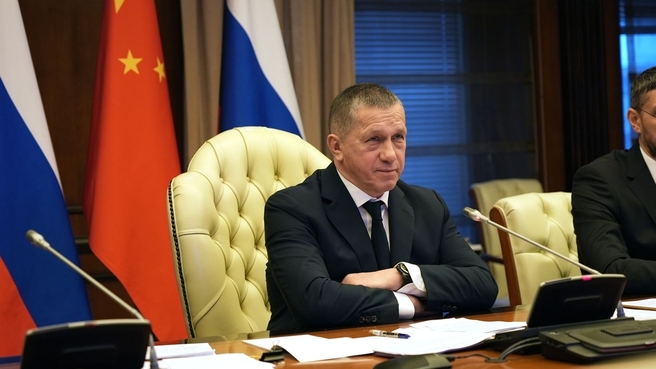Yury Trutnev: “We are ready to work together with our Chinese partners and invite the leading research centres and technology companies of China to take part in high-tech projects.”
On 24 November, an inter-session meeting of the co-chairs of the Russia-China Intergovernmental Commission on Cooperation and Development of the Far East and Baikal Region of Russia and of Northeast China – Deputy Prime Minister and Presidential Plenipotentiary Envoy to the Far Eastern Federal District Yury Trutnev, and Vice Premier of the State Council of the People’s Republic of China Hu Chunhua – was held via videoconference.
Yury Trutnev noted that China was Russia’s main economic partner in the Far East: “The volume of trade between our countries is growing. Over the first nine months of 2021, the Far East’s trade with China amounted to $9.5 billion, which is an increase of 17.2 percent.”
State support measures also encourage the inflow of foreign investments to the Russian Far East, such as preferential treatment in priority development territories and the free port of Vladivostok. Over 2,600 projects worth around $90 billion of investment are being implemented in the Far Eastern Federal District with state support. As many as 56 projects involving Chinese capital with a total amount of investment reaching $2.4 billion are being implemented in the Far Eastern priority development territories and the free port of Vladivostok. These include projects in such sectors as industrial production, agriculture, construction, transport, and logistics.
Fostering the development of advanced technologies was noted as a main area of cooperation. In accordance with the Presidential Executive Order, work is underway on Russky Island to create an innovative science and technology centre. A special legal regime is provided, with tax incentives, special conditions for foreign professionals and the possibility of land grants for creating scientific and commercial infrastructure to launch innovative projects. Biotechnology, the World Ocean, ICT and robotics will be the main areas of the center’s activities.
“We are ready to work together with our Chinese partners and invite the leading research centres and technology companies of China to take part in high-tech projects,” Yury Trutnev said.
Cooperation in foreign trade and transit shipping of goods via Russian-Chinese border crossings were discussed. According to the Russian deputy prime minister, it is necessary to introduce new mechanisms to improve interaction between the two countries. He suggested the Chinese side consider the use of the green corridor mechanism in cooperation with Russia, which would optimise the sanitary and quarantine regime for the passage of goods.
During the meeting, cargo traffic via the bridge crossing on the River Amur between Blagoveshchensk and Heihe was also discussed. The parties agreed to make every effort to ensure that traffic on the bridge starts as soon as possible while complying with all public health requirements.
Cooperation in regulating carbon was also discussed. According to Hu Chunhua, China was ready to implement joint projects related to improving energy efficiency and the use of alternative energy sources, among others.
By 2030, the Russian Federation plans to reduce greenhouse gas emissions to 70 percent of 1990 levels. The Sakhalin Region was chosen as a pilot region to test the special regulation of greenhouse gas emissions. The possibility of creating a hydrogen cluster on the territory of the island region is being studied. Several Asia-Pacific states have shown interest in this work. The Chinese side was invited to consider participating in this project.
The agenda also included cooperation in urban construction and building materials. At the sixth Eastern Economic Forum, President of Russia Vladimir Putin decided to start a large-scale renovation of Far Eastern cities.
“We begin to work on the design, and six months later we will get down to the construction. China has unique experience in large-scale construction. We would also like to suggest Chinese companies examine the possibility of taking part in this large-scale effort,” the Russian deputy prime minister said.
His Chinese counterpart expressed interest in implementing projects related to the production of frost-resistant building materials, smart cities, and urban planning.
“The pandemic made changes to people’s lives, as well as economic development trends. Entire sectors of the economy have found themselves in a difficult position; people-to-people contacts have decreased, and the tourist flow is reduced. An entire range of restrictions has been introduced in all countries out of concern for the citizens’ health and lives. At the same time, I would like to note that the Russian and Chinese nations are bound by long-standing relations of friendship and neighbourliness. I am confident that we can rely on this foundation to overcome any challenges and use mechanisms that make it possible to effectively cooperate in an ever-changing world,” Yury Trutnev concluded.












